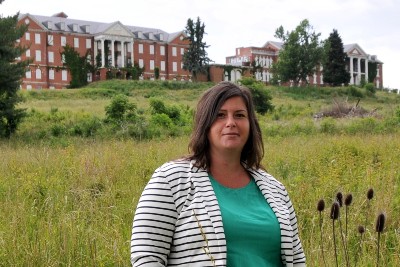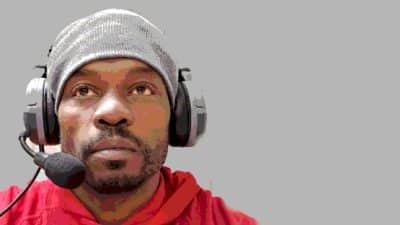
By Rebecca J. Barnabi
For Augusta Free Press
Renee Hall lives in Staunton and is president of NAMI Central Shenandoah Valley We Care.
She and her husband, Daniel, have four daughters, ages 27, 21, 20 and 11.
Hall grew up in Northern Virginia, and actually came to know Staunton in 1991 when she was 16 years old under very different circumstances.
“My story begins in Staunton because I was brought in shackles to the Dejarnette Center for Children and Adolescents,” said Hall.
Hall had been taken out of her mother’s care at age 9 because of parental abuse. She bounced among family members until living in foster homes — seven in one year. By age 16, she had tried living with her father in Northern Virginia.
“I was very depressed. And I had been tortured as a child,” she said.
The foster care system continued the abusive relationships she had known with family. A foster sister taught her how to overdose on medication, which she did when she was 16 after receiving a break-up letter from her boyfriend.
“And it was a catalyst for me to call 911, because I had taken these pills,” Hall said.
She said her family’s words never mirrored their actions to help her, and a judge in northern Virginia placed her at the Dejarnette Center, which is now the two buildings wasting away off of Frontier Drive in Staunton, condemned several years ago.
Coming to Staunton was kind of tragic for Hall, “because it was a blessing in disguise for me to receive the treatment I so desperately needed.” The staff helped her and encouraged her to get better. She said she knows the perception the public has of the center is the opposite of what was her experience. “My time there was positive.” The compassionate staff impacted her life, and they are why she has spent her adulthood advocating for mental health awareness. “I see those buildings and my heart sings,” she says of the old Dejarnette Center.
In addition to her role as president of NAMI, Hall also serves as a liaison between Western State Hospital and On Our Own, an organization that assists discharged mental health patients. The group consists of peers with mental health illness and substance abuse issues themselves.
NAMI serves to educate, advocate and support the cities of Waynesboro and Staunton, and the counties of Augusta, Rockbridge and Bath. The organization provides a network with other support services and also provides peer support groups.
“It allows me the platform to encourage other people not to stigmatize mental health,” Hall said. And to encourage anyone struggling to look inward about their own mental health.
Hall stayed at the Dejarnette Center for almost a year, then was in danger of falling through the cracks when it came to obtaining support after her stay in the facility. Placement options to keep her away from family members who had contributed to her ending up at the center were not available. She said she returned to her father.
“I almost didn’t survive that attempt,” Hall said.
So her psychiatrist at Dejarnette co-signed for her to get an apartment in downtown Staunton.
“They went over and above,” she said of the center’s staff. She advocates now for anyone suffering with mental health illness so that she can give the support to someone else that the Dejarnette Center staff gave her.
Eventually, Hall resumed a “careful” relationship with her mother. Therapy taught her to set boundaries with her mother.
“I knew when I was to become a mom, I wanted to have a relationship with my mom, but not become my mom,” Hall said. She said she is open with her four daughters about her mental health journey, and they witnessed some of it when they were young. “They are supportive.” She said her children are impressed with how far she has come in her mental health journey.
Hall’s mother died in 2009. She grieved “the loss of the potential of us having a good relationship.” But by then Hall had come to understand generational traumas: that her mother had also been abused and that’s why she abused Hall. Before her mother died, Hall said she hoped their relationship would continue to grow past the trauma.
After her time at the center, Hall said she did not qualify for college assistance until she was 22 and had her first daughter. She held three jobs sometimes to make ends meet. Life wasn’t easy, but “it was definitely worthwhile being on my own.”
“I believe that knowledge is power and knowing is half the battle,” she said of her mental health journey since then, and the importance of understanding genetically-predisposed illness, including mental health.
The boyfriend who wrote the break-up letter when she was 16 became Hall’s husband in 2020. She said having a supportive spouse, her children, gardening and simple every day things like coffee with a friend help her every day on her mental health journey.
“I give myself permission to process through the enormity of whatever I’m feeling,” Hall said, and her husband provides additional support.
She said it is all right to give ourselves permission to have off days when struggling with mental health. “I believe these emotions come up for a reason,” she said of bad mental health days. Feeling them and processing them is an important part of the healing process.
“There’s an ebb and flow with recovery,” Hall said.










